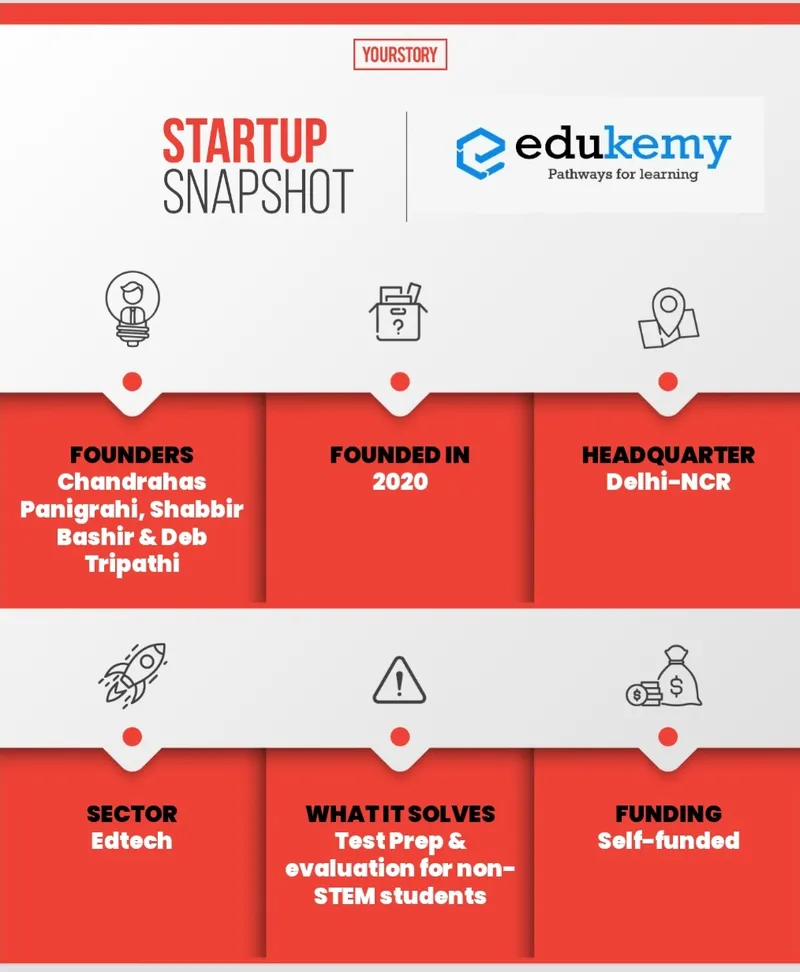Edtech startup Edukemy helps non-science stream students crack civil services exams
Delhi-NCR-based startup Edukemy’s USP is its tech-enabled evaluation model and personalised learning pathways for non-science stream college and university students.
In India’s cluttered coaching landscape catering to everything from school and board-level preparations to a slew of competitive tests, an edtech startup launched last year is focused on training non-science stream students to crack the civil services exams.
Delhi-NCR-based Edukemy has built a tech-enabled standardised evaluation model for the non-STEM (science, technology, engineering, and mathematics) category to create personalised learning pathways for every student, says Chandrahas Panigrahi, one of the three founders.

Chandrahas, counder of Edukemy
Chandrahas, along with Shabbir A Bashir and Deb Tripathi, graduated from the University College of Engineering in 1996 and each of them has around 20 years of work experience across corporate and education sectors. They all wanted to do something in education; in fact, Shabbir is a teacher, who has been running the education company SAB Learning Systems, which he co-founded in 2018.

Snapshot
“Turning our passion into reality, we wanted to focus on IAS competitive exams and ultimately the government test prep segment,” says Chandrahas.
“Our priority is to scale the learning experience for every student and offer an insightful and enriching environment. The focus is on personalisation by providing live, interactive, immersive, and democratised education in Tier-II and III cities.”
This includes “pre-class, in-class, and post-class engagement models” for undergraduate and postgraduate students of arts, commerce, and law courses who want to clear the Union Public Service Commission (UPSC) exams, he says.
Given that more than 12 million students from non-science streams enter college every year in India — according to the Department of Higher Education — there is market potential in guiding such UPSC aspirants.
The learning model
Eduekemy offers digital courses with doubt-solving interactive classes and digital mentoring. The learning model is focused on a few key steps: pre-evaluation, where the needs of students are understood and a pathway laid for their growth; digital evaluations, comprising subjective and objective tests that enable students to understand how well they are prepared.
Digital courses are offered in geography, sociology, history, policy, economics, essay writing, and general studies.
“We simplify the content with cutting-edge evaluation tools using artificial intelligence and machine learning technology,” says Chandrahas.
The focus is on curating processes and solutions rather than following a marketplace model, he says.
“We are platform enablers for ‘content and teacher’ as a combined solution versus a ‘star teacher’ or tech platform methodology.”
Market dynamics
Edukemy charges Rs 22,500 for subscription to its content and teaching.
The first batch of more than 300 students signed up in April last year for the IAS test prep course, says Chandrahas. At present, the startup has more than 5,000 subscribers.
Even as the edtech sector has been flourishing in the country, especially since the lockdown early last year, Chandrahas says access and understanding of technology and internet penetration are still challenges, particularly in rural areas.

Chandrahas, co-founder of Edukemy
“Our platform relies solely on online education, so technology is a key component in ensuring business continuity,” he says.
“We are aware that India is still evolving in terms of technology and internet penetration is lacking in rural areas. It is a challenge and is being resolved to some extent.”
The startup is self-funded, but the founders do not want to disclose their investments in the business.
Chandrahas says that as the non-STEM segment is a “selective and niche segment” it poses a challenge in raising capital.
The startup competes with edtech companies such as BYJU’S, Gradeup, Testbook, and Unacademy that offer test guides and/or live learning platforms for civil services exams, among their other products.
Edukemy expects to close its first year with Rs 7-7.5 crore in revenue.
Edited by Lena Saha








